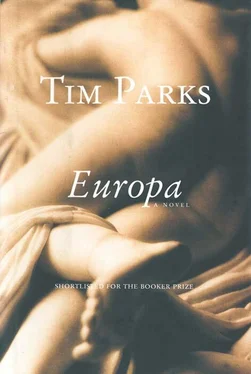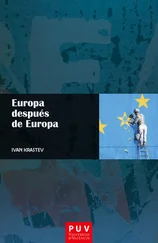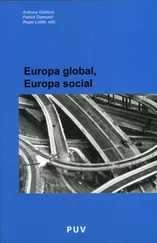Sitting slightly off-centre in the back of this coach hammering due north towards the imagined focal point of a continent whose precise borders have never been clear to me, and in the midst of this chatter of anecdotes about coincidences and intuitions notoriously catastrophic, I suddenly find myself bound to consider as lucidly as ever I can this new and increasingly shocking thought, this hypothetical lesbian relationship between my ex-lover and my daughter, a relationship, I reflect now, which would in no way be a crime under the law as it stands , as so many of the most terrible things we do to each other, I tell myself, are not even misdemeanours, in legal terms, are they? since we are all free agents, so called, I tell myself, except where property and money and the most basic aspects of physical well-being are concerned. Yes, I try to consider such a relationship — her and my daughter — in its practical, erotic, social and spiritual aspects, with all the awful and fascinating images such an eventuality conjures up. And I’m appalled. Partly by the idea itself, but mostly by the thought that I have had this idea. Why do you have ideas like this, I demand of myself? I’m furious. Though at the same time I can’t help wondering at the astonishing fact that after eighteen miserable months I am still able to formulate a new thought, however unsavoury, however unwanted, about a situation whose exotic and squalid permutations I imagined I had already shuffled and reshuffled in every possible self-destructive combination.
Such, in any event, is my state of mind when Vikram Griffiths appears at the back of the coach together with his dog, snuffling and wagging, to say in a low but excited voice, squatting down, to myself and to Georg, and hence inevitably to the girl between us, that he is convinced there is a spy amongst us, a turncoat, a scab, someone who, in return for guarantees that they won’t lose their position, is keeping the University informed as to our every move and who, when we arrive in Strasbourg, will be behind the scenes putting the University’s case to the very important people we have arranged to meet and above all taking notes of what we say so that the University will then be in a better position to prepare a rebuttal. And the thing to do, Vikram Griffiths says in his low, deep voice that everybody can hear, all the time playing with the ears of this nondescript mongrel dog, the thing to do if we manage to find out who this spy is, would be to throw them off the coach immediately and leave them to walk back home.
Turning to look out of the window, still with my daughter’s possible lesbian seduction in mind, I see the drizzle is thinly persistent as we leave the dull ribbon development north of the city for the duller reafforestation of the first hills that climb towards Switzerland, a country which despite its centrality and its admirable example of the possibility of federal coexistence between different ethnic groupings is ironically not part of that Europe to which we are appealing. Through spattered perspex I see the drizzle, the sharply rising hills, the fleeting proliferation of all those details one so pointlessly takes in each moment one travels, only to expel them a moment later, like the air we breathe, the people we speak to on the street, and I must say, looking at that glum rain, the dark gesturing of those slopes, that the idea of walking back home is not unattractive, not unattractive at all, though from further up in the mountains would be better. Yes, walking back, I reflect, as the crow flies, under rain, through wet grass, alone, sovereign, preferably with streams to wade, rocks to scale, is not an unattractive prospect. I can imagine bruising my knee and my cheeks scoured by strong winds, a half-eaten apple in my pocket, and there would be mud, nightfall and dawn, ditches and crusts. How adolescent and attractive that is! But I say this of course because I’m already remembering how I once thought, indeed how I once wrote, in a letter to her , though whether it was one of those I sent or one of those I destroyed or one of those I neither sent nor destroyed, I cannot recall — how love (I meant our love) might be likened to some exotic holiday location where you arrive by plane with a pocket full of credit cards and an immense and criminally complacent smile on your face, only to find when the statutory fun is over that there is no flight back , you have to walk back home. And somehow you have lost everything, your ticket, your Eurocard, even, worst of all, your carta d’identitd . You have to walk back, no planes now, alone and barefoot, over the wildest terrain, crossing angry seas on makeshift rafts, without any sense of direction, without even looking forward particularly to the arrival, without even knowing perhaps what home would look like when and if you got there, for somehow you have no memory of what it might feel like to say to yourself, Now I am at home, now I am back. Until, caught deep in the forest, or exposed on a rocky hillside under a twittering of unseen birds, the obvious finally occurs to you: you’re not even on the same planet. That plane- you boarded flew you to a different world. The love plane. Thus my scribblings in a letter to her, remembered now on the swaying coach. It was a miracle of science, I wrote. I don’t know whether I sent the thing or not. As for walking home, you might as well set out for Andromeda on foot.
A spy! Vikram Griffiths repeats, clearing his gravelly throat.
But Georg, to my left, is wry. Georg has an immense capacity to be composed and to be wry, about which much, very much could be said. On the other hand, who would want to take this quality away from him? Who would not envy him? To Vikram’s Welsh-English, Georg replies in German-Italian. How does Vikram know there is a spy? he asks. Has he found a cigarette packet with a radio transmitter inside? A bug taped under the collar of his dog? Or a false moustache? Has some top-secret document gone missing?
But at this point both Colin and Dimitra come down the aisle to join us, for with the kind of postures Vikram has been assuming, bending down, loudly whispering, scratching in his sideburns, adjusting his cheaply framed glasses always askew on a somehow exotic stubbornness, a nervous intellectual charm, set off and thus enhanced by this shaggy, nondescript outdoors sort of dog he has, and smells of — with all this posturing it is perfectly obvious that the trip’s first serious confabulation has begun, the first council of war. So now there are three people plus the animal crowded into the aisle where it meets the big back seat and of course the girl on the seat in front of me turns round again, kneeling, and she smiles, and noticing her Vikram Griffiths ruffles her jet-dark hair with great familiarity, much as he does with his dog, and calls her Sneaky and asks her how she’s doin', without a 'g', because it ought to be said in Vikram’s defence that he knows the names of all the students, whereas I can never remember any of them, and if he can’t remember their names, he gives them nicknames like Sneaky, or Sly, or Boris, so it’s as if he knew their names, and understandably this makes him popular, the way clowns are popular, and renowned for finishing sadly and badly.
I’m all right, thank you, Dottor Griffiths, the girl says, in English. Her strong chin dimples in embarrassment when she speaks, but with his fingers scratching at the back of his neck, Vikram has already turned away. He is saying excitedly: Dimitra, Dimitra, come here then, you tell them.
Dimitra is a Greek woman. She begins to explain. In her role of presidente of our union it was obviously her task to inform the head of the language faculty that we had voted to abstain from our duties for a period of three days in order to take our case to Europe. Right?
Читать дальше












